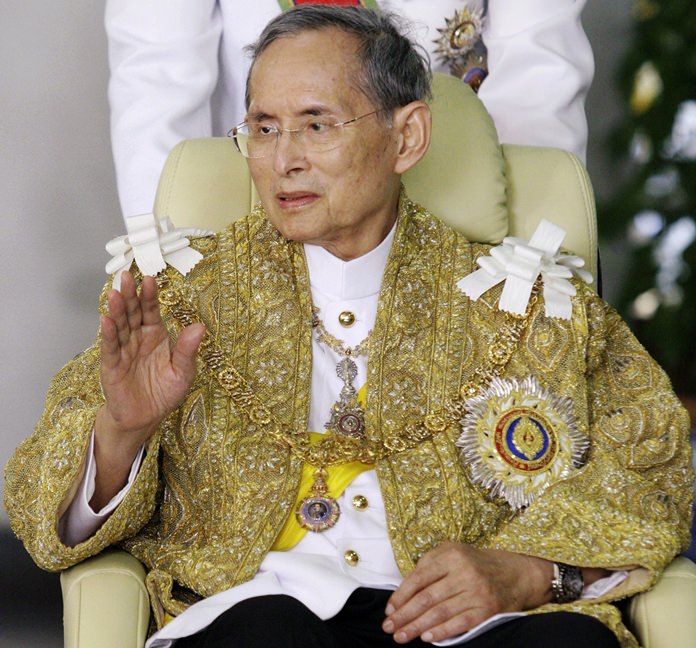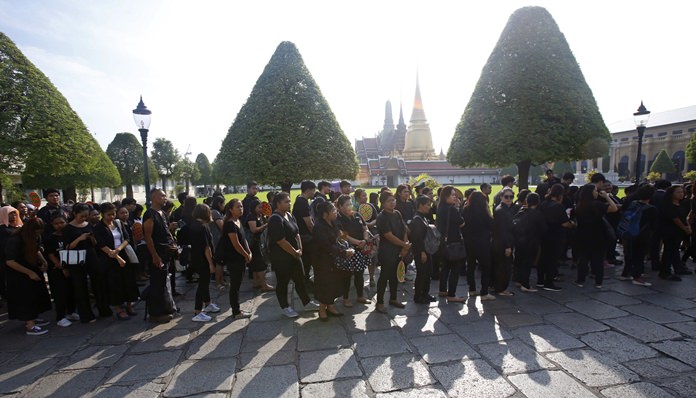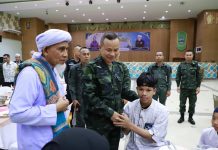Bangkok (AP) – Grieving Thais went to work dressed mostly in black this week, after the palace announced the death of their beloved King Bhumibol Adulyadej, the world’s longest-reigning monarch. He was 88.

Traffic and businesses appeared to be running normal, but many Thais – some seen crying – were dressed in muted colors and there was a somber mood on the streets following an outpouring of sorrow on Thursday when HM the King’s death was announced. Television channels ran shows devoted to HM the King’s life.
The news had been expected, and hundreds of people had gathered since Wednesday at Bangkok’s Siriraj Hospital, where HM the King had been treated for various ailments for much of the past decade. Many sobbed loudly, clutching each other in anguish and shouting “Long live the King!”.
“There is no word to explain my feeling right now,” Gaewkarn Fuangtong, a humanitarian worker, said in Bangkok’s financial district. “I lost one of the most important people in my life. I feel like I haven’t done enough for him. I should have done more. I will do good, do better for his sake.”
The government announced a one-year mourning period and a 30-day moratorium on state events, and all public offices and schools will fly flags at half-staff for 30 days.
But businesses, tourist attractions and public transport were to remain open because of the government’s desire not to hurt the sputtering economy.
“The stock market, investments, other businesses should not stop. Do not try to let the country lose its credibility, especially in the case of impact on the stock exchange,” Prime Minister Prayuth Chan-ocha said in a televised address to the nation.
He said Crown Prince Maha Vajiralongkorn will succeed HM the King under the constitution, but had asked for more time to mourn with the nation before ascending the throne. No date has been set for his coronation.
Most Thais have seen no other king in their lifetime and thought of HM King Bhumibol Adulyadej, who reigned for 70 years, as their father and the embodiment of goodness and godliness.
Although a constitutional monarch, he wielded enormous political power and served as a unifying figure. But in recent years, he suffered from a variety of illnesses that affected his kidneys, brain, lungs, heart and blood.
“Since I was young I saw him work really hard, and now it’s hard to explain. I feel numb inside,” said Danaiwut Wiroonpiti 26, a photographer who was crying outside the Grand Palace where HM the King’s body was taken in a procession Friday. “He’s the center of all Thai people. It’s like we lost the main pillar of our lives, the person who holds us together. I can’t hold my tears.”
Portraits of HM the King displayed in most Thai homes and businesses generally depict him in arduous travels to remote villages, where he often went to see the situation of his subjects first hand.
On Sunday, Oct. 9, the palace announced his health had become “unstable,” and on Wednesday, Oct. 12, Crown Prince Vajiralongkorn rushed back from Germany, Prayuth canceled a trip abroad and Royal Family members began gathering at Siriraj Hospital.
He died a little before 4 p.m. on Thursday, the palace said. His death was announced three hours later in a broadcast carried simultaneously by all TV stations.
“Even though the board of doctors has closely monitored and treated him to the best of its abilities, HM the King’s condition never improved,” the palace said in a statement. It said he passed away peacefully.
“He is now in heaven and may be looking over Thai citizens from there,” Prayuth said in a statement. “He was a king that was loved and adored by all. The reign of the king has ended and his kindness cannot be found anywhere else.”
Messages of condolences poured in from across the world.
“With a creative spirit and a drive for innovation, he pioneered new technologies that have rightfully received worldwide acclaim,” U.S. President Barack Obama said. “His Majesty leaves a legacy of care for the Thai people that will be cherished by future generations.”
French President Francois Hollande hailed HM the King for “exceptional human qualities … his profound sense of justice, his care for modernity and sustainable development.” Indian Prime Minister Narendra Modi described him as “one of the tallest leaders of our times.”
Bhumibol Adulyadej (pronounced poo-mee-pon ah-dun-yaa-det) became king in 1946. He anchored the Southeast Asian country through violent upheavals at home and communist revolutions next door with a blend of majesty and a common touch.

Government spokesman Sansern Kaewkamnerd said for the next 30 days all TV and radio stations, including online media, will broadcast the same programs provided by a government-controlled pool. He did not specify foreign TV channels in the rule, but on Thursday night all channels on the country’s main satellite TV service, including BBC and CNN, were replaced by the pool footage. Some have since returned to normal broadcasting.
Associated Press journalists Natnicha Chuwiruch, Kiko Rosario, Tassanee Vejpongsa and Nattasuda Anusonadisai contributed to this report.




